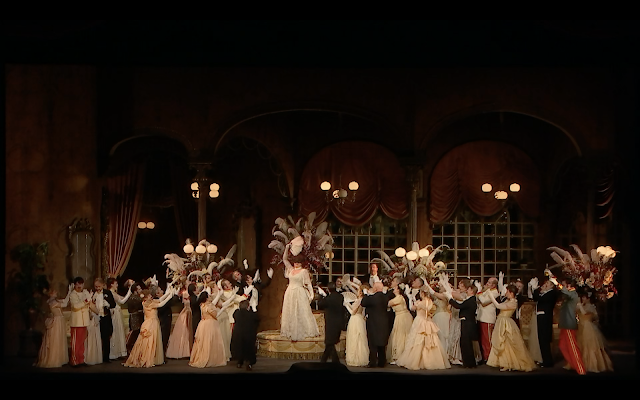Vienna State Opera (live steam), 31/12/2021
Johann Strauss II : Die Fledermaus
Chorus and Orchestra of the Vienna State Opera
Bertrand de Billy
It seems peculiarly appropriate to be watching a performance of Johann Strauss Jr.'s Die Fledermaus on the evening before the ineluctable New Year's Day concert, a performance at the Vienna State Opera, whose orchestra is the seeding-ground for the players of the Vienna Philharmonic. Somewhat miraculously, given present conditions internationally, there was actually an audience present, no doubt vastly reduced, but it does make a difference, particularly in operetta, where the cast really benefits from having the physical presence of spectators off which to bounce their repartee.
Otto Schenk's production is as traditional as it gets, in the appropriate period setting, with heavy, handsome sets (which put the house's turning stage to excellent use) and lavish frocks for the ladies, plus, there's a choreographed interlude during the second act, set to the "Thunder and Lightning" Polka. This is not a new production by any means, I think it's probably well over the 30-year mark by now, and for my taste, the present re-staging has veered too far into the realm of caricature, particularly in the second act, and would benefit from being thoroughly refreshed and simplified. I found myself particularly resenting the exaggerations of the Czardas, which is a magnificent moment, and which Rachel Willis-Sørensen sang well, but which she would have sung even better without the puffery imposed by the present state of the production.
 |
| Rachel Willis-Sørensen (Rosalinda), Act 2, Die Fledermaus Vienna State Opera, 31/12/2021 (screenshot) |
I could wish the subtitles were a little more reactive, it's quite plain to hear that there's more being said than appears on-screen, but I'm grateful that they're provided in the first place, many houses do not, or cannot provide subtitling for live-streamed performances, only for replays. However, some of the jokes, which may have been improvised for the evening, notably in the case of Frosch's monologue, did not get translated and consequently went straight over my head. Although I did, partially, get the joke that Cell N˚ 13 was intended for the conductor.
Musically, the evening began somewhat shakily. Not from the orchestra, which was on sparkling form under Bertrand de Billy, but in the first act, all the cast, without exception, seemed at times unable to keep up with the conductor's chosen tempi. De Billy was setting a crisp pace, certainly, but not unduly so, I thought, and it was a little shocking to hear them all, at one time or another, lagging quite markedly. Things improved in the second act with the presence of the chorus, fortunately.
I can't say that this was a vocally dazzling plateau either. Willis-Sørensen, who is a singer with a startlingly wide-ranging repertoire, brought a lush, creamy timbre to Rosalinda, but a slightly stolid presence, not helped by the fact that she seemed to tower over all her cast-mates. I assume she's naturally tall, and Rosalinda's fairly high wigs in this production did not help, but particularly in juxtaposition with the Alfred of Hiroshi Amako, who stood a clear head shorter, it did look somewhat unfortunately humorous. Amako's ebullient performance was, however, quite pleasing. Vera-Lotte Boecker was a fresh-voiced Adele, but a little forgettable, as was Wolfgang Bankl's Frank. I liked both Christina Bock (Orlovsky) and Clemens Unterreiner (Dr. Falke), again without being especially struck by their voices.
The cast-member who gave me the most problems at that level was Andreas Schager, as Eisenstein. I've not heard this singer before; from his biography, he's a heldentenor, which is not unusual in this role (although I tend to hear it more often sung by a baritone), but the voice seemed curiously unfocused. Not bad, not out of pitch, sometimes out of time (but that was true of everyone at some point or other, as already mentioned) just - displaced. It was a rather odd impression. The one time he really came into his own, in my opinion, was in the Prison Trio, which was much stronger and clearer.
However, there was always the orchestra, the wonderful Vienna State Opera Orchestra, in truly festive mood, glittering and glorious, a real joy from start to finish, and that alone made the performance worth hearing, and a fine preparation for the New Year.
[Next : 13th January. Happy New Year to all]
